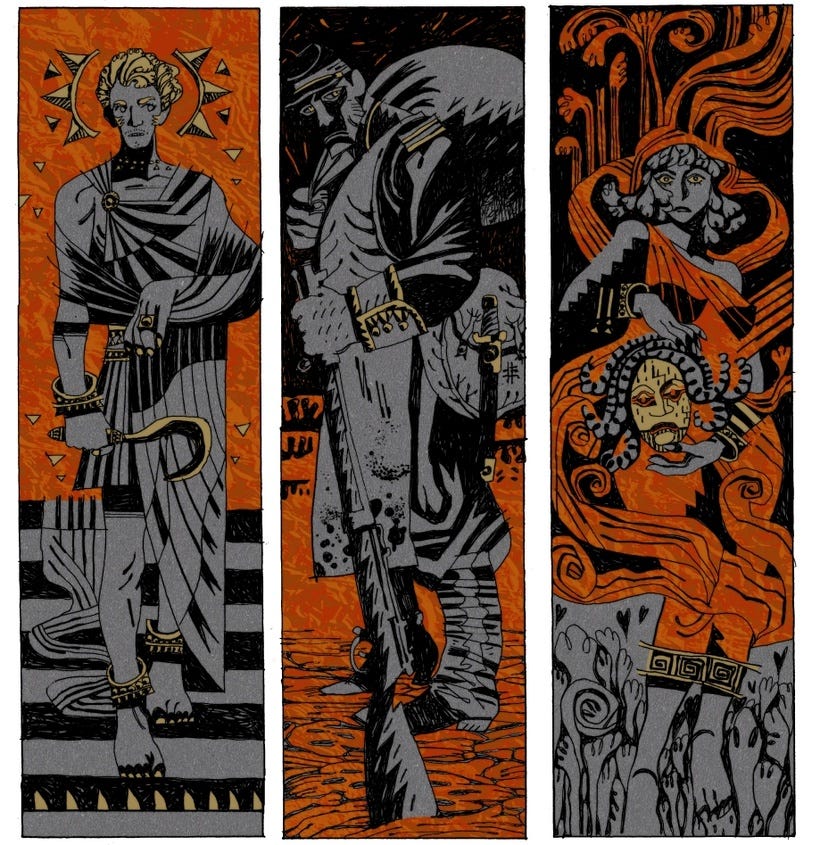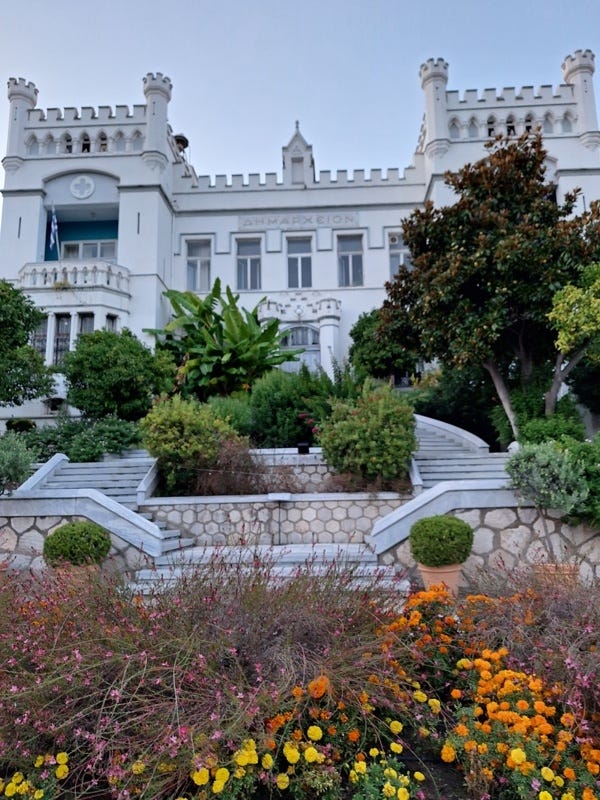"Maybe you don't recognize me," he said. "I'm Kaloyan's dad.* I'm on a diet and exercise regime and I've lost 20kg. You've lost weight too!"
I had approached Ellie's birthday party with calm determination. She wanted to celebrate in Sofia with her friends in a "children's center," which meant Pavlina and I would have to stay there the whole time, talking to the other parents.
This wasn't my first rodeo. I pre-ate. I made myself coffee at home. I went into the parents' area and turned down the music and the space heater. Now in a bearable environment, sated on protein and coffee with milk, I could speak from a position of strength about diet and excerisze. I was profoundly grateful to be given this topic of conversation.
It was true that I didn't recognize Kaloyan's dad. The embarrassing fact is I have a habit of zoning out during Bulgarian conversations. Although I could focus on remembering people's names and faces, or even deciphering what they're saying, I often prefer to save that energy for inventing excuses for my incivility.
But that's a hard way to live. I don't want to be the guy who spends the party squinting at his phone. I want to be able to talk to my neighbors, other parents at my kids' school, other writers in Sofia.
Now comes my second admission: it's that last necessity that pushed me over the edge. I need to be able to participate in the writing scene in Sofia. In order to do that, I need to be able to sit at a table and talk with Bulgarians.
All right, then! Challenge accepted. I couldn't motivate myself with appeals to courtesy, neighborliness, or filial duty, but professional development I can do.
I talked with Petar about his busy Saturday schedule, and the reconstruction at TSUM with another dad whose name I can't remember. Kaloyan's dad wanted me and Ellie to go "winter-skating" with him. I don't remember how we got onto the subject of Dimitar's escape from Russia.
I knew that one of Ellie's friends was from Russia, but I assumed his parents had just dropped him off and left. The bearded man at the other end of the table had spent most of our conversation squinting at his phone, but when he spoke, it seemed to me that his Bulgarian was perfect. He even had the Sofia accent where unstressed /o/ becomes /u/. It was only after Kaloyan's dad complimented Dimitar on his Bulgarian that I focused and heard his /je/ rather than /e/. But even then I might have just assumed he was from Pleven.
It turned out that Dimitar's dad had been Bulgarian, so he'd only had to recover his childhood language after moving here last year. His own son, though, had only come to this country with two words of the language.
"That teacher is good," said Pavlina. "Ellie's older sister's teacher recommended her to us because she knows what to do with bilingual children."
"We couldn't believe it when we came here," Dimitar said. "We step out of the plane and there's a public Russian school? It's very good for us, of course, but how can you use tax money to teach kids Russian? Why not German or French?"
There are public German and French elementary schools in Sofia, too, but we all knew that the real question was "why learn Russian at all?"
"Pavlina heard some high school students ask that question," I said. "Do you remember? Last year."
She took the cue. "At the graduation ceremony," she said. "I was backstage with Ellie and I overheard some seniors talking. One of them asked, 'what will we do with Russian after we graduate? We can't go back to Russia. We can't work for a Russian company.' But another one said, 'we know a whole language. We can find something to do with it. We don't know what will happen in the next twenty years.' During the ceremony, one of those boys recited 'Monument' by Pushkin,' and it was excellent."
Dimitar was pessimistic about the next twenty years. "Russia had democracy for one month in 1917 and one year in the 1990s. Otherwise it was Fascist, then Communist, and now it's Fascist again. Next, you know, the thing in a clock," he made pendulum motions, "will swing the other way and Russia will be Communist again."
I understood that Dimitar had checked out of Russia. He wanted to think about the future of his family in Europe. I was just glad for him that they'd gotten out.
The conversation continued, but after a while I realized I hadn't understood most of what was being said. I'd been working by Bulgarian social muscles for an hour and a half and the carbs in that piece of cake weren't doing my brain any favors.
I excused myself and went for a walk until the party was over. When we got home, I lay on my bed, exhausted, until it was time to go to sleep.
We got to do what we got to do. More than that, we got to be able to do what we got to do. That means exercise. Work the muscles, develop the skills, so that when the challenge comes, you can meet it. Nobody know what will happen in the next twenty years.
As I’m sure all of you know, I have begun serializing Wealthgiver both on Patreon and Substack. That crunchy cover art is the work of Artyom Trakhanov, who is always a pleasure to work with, and whose skills speak for themselves. I literally only just now noticed the skulls on the ground under Andrei's feet. Cheers, bate.
And I read some books this month.
Orthodoxy by G.K. Chesterton
I picked up Chesterton because he was an influence on C.S. Lewis, but I have to say I got more out of Lewis. Chesterton gets preoccupied with his own choice of words, so doesn't always get to where he's going. That's fine for the autobiographical aspect of this book, but as far as theology goes, I don't think he convinced me of anything I didn't already believe - and I want to believe. Still, this book was a comfort.
Zero to One by Peter Thiel
I liked it. My wife really liked it.
It's a pared-down book, which I appreciate. The Basic mental tools - definite optimism, the important truth question, zero to one - are useful. I'll have to come back to this book.
King Solomon's Mines by H. Rider Haggard
I tried to read this once, stopped, and came back to it as an audiobook. I wasn't put off because of the slow start - in fact my favorite part was the detailed description of outfitting an expedition through the Kalahari desert. But the lost tribe they found was disappointing. I would have been more interested in learning about the real 19th century Zulus.
Space Pirates of Andromeda by John C. Wright
It's not often you get to read a real homage, in which the writer loves the source material and extends it. Here, John C. Wright asks "what if the Star Wars sequels were good?" Space Pirates of Andromeda gives us a very satisfying answer.
Wright plays his usual trick of packing an epic trilogy's worth of detail into the backstory, of which he then reveals very little. There's a robot in a tophat and a winged pirate queen, but you don't get to hang out with them. You're mostly on a pirate ship. To be fair Wright dumps so much punishment on his protagonist that you spend most of your mental energy wondering how the boy's gonna make it out of this one.
I also have to admit I loved the little asides about why robots are all built with hands and why supertech guns shoot balls of plasma rather than bullets. Those are some sweet justifications.
Theft of Fire by Devon Eriksen
Theft of Fire is a brutally honest blast, pulling us through the development of a relationship between people who cannot, but must, trust each other. I wasn't satisfied with the ending, and I don't think the science fiction goes far enough to distinguish itself from Firefly and The Expanse, but the characters really work. The sex and violence, as intense as they are, work too.
What Is Art? by Lev Tolstoy
It would be better if Tolstoy had spent more time describing what art is rather than what it isn't. There's quite a lot of complaining. But Tolstoy does answer his own question: art is the infection of a one person with the experience of what it is like to be another. I don't have a better suggestion.
The Chrysanthemum and the Sword by Ruth Benedict
The best anthropology is the kind that tests hypotheses. In The Chrysanthemum and the Sword, Benedict's posits that the apparent contradictions in WWII Japanese society were caused by a basic desire to be respected, and what is worthy of respect is to act wholeheartedly, holding nothing back. It's a good explanatory model, and more importantly it produces prescriptions that seem to have worked. Benedict unapologeticaly offers advice to Douglas MacArthur's SCAP government on how to best govern Japan according to American interests. It seems to have worked.
See you next month
*None of these names are real




